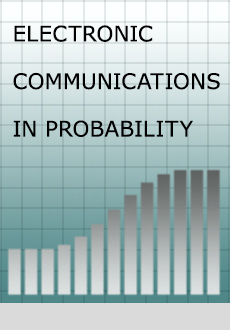Abstract
Typically, a stochastic model relates stochastic “inputs” and, perhaps, controls tostochastic “outputs”. A general version of the Yamada-Watanabe and Engelbert the-orems relating existence and uniqueness of weak and strong solutions of stochasticequations is given in this context. A notion of compatibility between inputs and out-puts is critical in relating the general result to its classical forebears. The usualformulation of stochastic differential equations driven by semimartingales does notrequire compatibility, so a notion of partial compatibility is introduced which doeshold. Since compatibility implies partial compatibility, classical strong uniquenessresults imply strong uniqueness for compatible solutions. Weak existence argumentstypically give existence of compatible solutions (not just partially compatible solu-tions), and as in the original Yamada-Watanabe theorem, existence of strong solutionsfollows.
Citation
Thomas Kurtz. "Weak and strong solutions of general stochastic models." Electron. Commun. Probab. 19 1 - 16, 2014. https://doi.org/10.1214/ECP.v19-2833
Information





